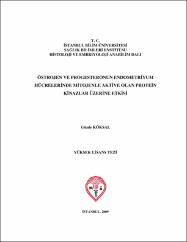Östrojen ve progestronun endometriyum hücrelerinde mitojenle aktivite olan protein kinazlar üzerine etkisi
Künye
Köksal, Gözde. (2009). Östrojen ve Progestronun Endometriyum Hücrelerinde Mitojenle Aktivite Olan Protein Kinazlar Üzerine Etkisi. Yayımlanmamış yüksek lisans tezi. İstanbul : İstanbul Bilim Üniversitesi, Sağlık Bilimleri Enstitüsü.Özet
Endometriyum, menstrual siklus boyunca başarılı bir implantasyon için steroid hormonlara cevap olarak bir dizi değişiklik geçirir. Hormonların koordineli üretimleri döngüsel olarak meydana gelen bu değişimde anahtar düzenleyicidir. Östrojen, siklusun ilk evresinde endometriyal proliferasyondan sorumludur. Progesteron artmış östrojenik etkiyi baskılayarak dokunun diferansiye olmasını sağlar. Östrojen reseptör antagonisti olan fulvestrant ise östrojen reseptörüne bağlanarak reseptörü inaktif duruma getirir ve proliferasyonu inhibe eder.
Çalışmamızda Ishikawa endometriyum epitel hücrelerinde 17-β-östradiol, fulvestrant ve progesteronun proliferasyon üzerine olan etkileri 5- bromo2’-deoksi-üridin (BrdU) işaretleme yöntemi ile S faz hücre oranları karşılaştırılarak değerlendirildi. Mitojenle aktive olan protein kinazlar (MAPK) embriyogenez, proliferasyon, diferansiyasyon ve apopitoz gibi işlevlerin ilerleyişinden ve strese yanıt oluşumundan sorumludurlar. MAPK ailesinin üyeleri olan p38, JNK ve uyarana ilk yanıt veren protoonkogenlerden c-jun’un steroid hormonların etkisi altındaki aktivasyon düzeyleri incelendi. 17-β-östradiol ile inkübe edilen hücrelerde S faz hücre oranı istatistiksel olarak anlamlı düzeyde artış gösterdi. Ancak fulvestrantın östrojenin proliferatif etkisini antagonize etmediği izlendi. Progesteron uygulanan hücrelerde proliferasyon oranında anlamlı bir değişiklik tespit edilmedi. Uygulanan konsantrasyon ve sürelerde östrojen, fulvestrant ve progesteronun JNK, fosfo p38 ve fosfo c-jun ekspresyon düzeylerinde bir değişikliğe yol açmadığı belirlendi.
Elde edilen bulgular doğrultusunda endometriyum epitel hücrelerinde, siklus evrelerini kontrol eden östrojen ve progesteronun etkilerini JNK, fosfo p38 ve fosfo c-jun ekspresyonlarından bağımsız olarak gösterdiği sonucuna varılmıştır. During menstrual cycle endometrium makes serial changes in response to steroid hormones for a succesful implantation. Coordinated production of these hormones takes a key role in this change that happen in a cyclic way. Estrogen is responsible for endometrial proliferation in the first phase of cycle. Progesteron differentiates the tissue by suppressing the increased estrogen effect. Fulvestrant, estrogen receptor antagonist, binds and inhibits estrogen receptor and proliferation is inhibited.
In our study in Ishikawa endometrium epithelium cells the effect of 17-β-östradiol, fulvestrant and progesteron on proliferation is evaluated with comparison of S phase cell rates using 5-bromo 2’-deoxy-uridin labeling technique. Mitogen activated protein kinases (MAPK) are responsible from progress of functions such as embryogenesis, proliferation, differentiation and apoptosis and respond to stress. Activation levels of P38, JNK and c-jun which is immediately early response protooncogene are the member of MAPK family were examined under the influence of steroid hormones. In the cells which incubated with 17-β-östradiol, S phase cell rates increased statistically but fulvestrant did not antagonized proliferative effect of estrogen. On the cells that progesteron is applied proliferation rate did not change statistically. During time and concentration that is applied, estrogen fulvestrant, and progesteron did not change the expression levels of JNK, phospho p38 and phospho c-jun.
According to the findings that obtained, we conclude that in endometrium epithelial cells, estrogen and progesteron that control cycle phases show their effect independently from expressions of JNK, phospho p38 and phospho c-jun.


















